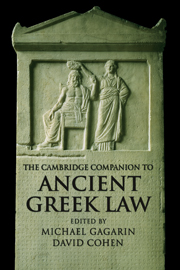Book contents
- Frontmatter
- Introduction
- Part 1: Law in Greece
- Part 2: Law in Athens I: Procedure
- Part 3: Law in Athens II: Substantive Law
- Part 4: Law outside Athens
- Part 5: Other Approaches to Greek Law
- 19 Law, Attic Comedy, and the Regulation of Comic Speech
- 20 Greek Tragedy and Law
- 21 Law and Political Theory
- 22 Law and Nature in Greek Thought
- Bibliography
- Index
21 - Law and Political Theory
from Part 5: - Other Approaches to Greek Law
Published online by Cambridge University Press: 28 August 2006
- Frontmatter
- Introduction
- Part 1: Law in Greece
- Part 2: Law in Athens I: Procedure
- Part 3: Law in Athens II: Substantive Law
- Part 4: Law outside Athens
- Part 5: Other Approaches to Greek Law
- 19 Law, Attic Comedy, and the Regulation of Comic Speech
- 20 Greek Tragedy and Law
- 21 Law and Political Theory
- 22 Law and Nature in Greek Thought
- Bibliography
- Index
Summary
INTRODUCTION: LAW, THEORY, AND POLITICS
In the modern world law plays a major role in theoretical writing about politics. This is especially true in the United States, where prominent judges write political philosophy and political theorists actively seek to influence judicial interpretation of constitutional law. Although no formal body of expert writing about law comparable either to American constitutional jurisprudence or to the great corpora of the Roman Jurists developed in Greece, normative and evaluative reflections on law-making and judicial practice appear early in Greek literature. By the late classical period, jurisprudence, in the extended sense of “philosophical writing about law” was a feature of Athenian political theorizing and litigants in Athenian courts made jurisprudential arguments to mass juries. The practice of law and the development of political theory were closely intertwined within the Greek experience; showing how they became intertwined reveals distinctive features of Greek law and political theory alike.
- Type
- Chapter
- Information
- The Cambridge Companion to Ancient Greek Law , pp. 394 - 411Publisher: Cambridge University PressPrint publication year: 2005
- 2
- Cited by



